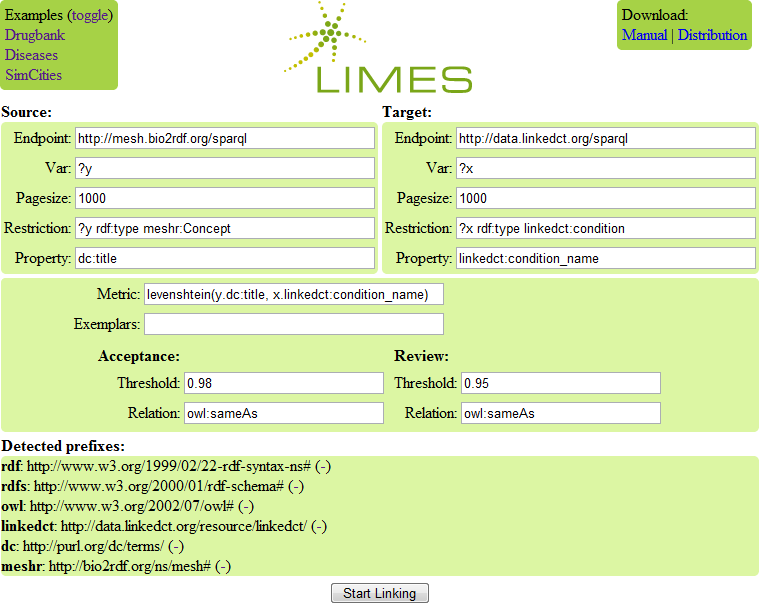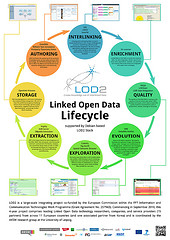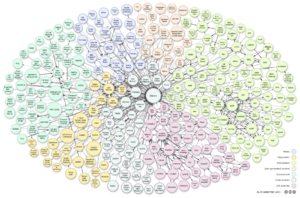It’s been a while since I last posted about LOD2. This doesn’t mean nothing is going on… on the contrary! We are working hard to make a life LOD users a bit easier. I could go on and on about this, but I won’t… not yet. This time I’d like to announce the 5th free LOD2 webinar about the tools in LOD2 Stack. Missed previous ones? You can find info about them on the LOD webpage.
Interested? Continue reading (the official text).
——
LOD2 Webinar: LIMES
The 1st version of the LOD2 Stack has been published in September 2011 in the form of a LOD2 Stack demo and the downloadable LOD2 Stack virtual machine image – additional details and the instructions on installing the LOD2 Stack from scratch are available in the HOWTO Start document.
Born from the wish to make linking tractable, the (LIMES) is tailored towards the time-efficient and lossless discovery of links across knowledge bases. LIMES is an extensible declarative framework that encapsulates manifold algorithms dedicated to the processing of structured data of any sort. Built with extensibility and easy integration in mind, LIMES allows implementing applications that integrate, consume and/or generate Linked Data. Within LOD2, it will be used for discovering links between knowledge bases.

LIMES dashboard (image from their official page)
This webinar will be presented by the LOD2 Partner: University of Leipzig (ULEI), Germany.
The LOD2 webinar series is powered by the LOD2 project organised and produced by the Semantic Web Company(Austria). If you are interested in Linked (Open) Data principles and mechanisms, LOD tools & services and concrete use cases that can be realised using LOD then join us in the LOD2 webinar series! The LOD2 team is looking forward to meeting you at the webinar!!
When : 27.03. 2012, 04.00pm – 05.00pm CET
Information & Registration: https://www2.gotomeeting.com/register/369667514
The LOD2 team is looking forward to meeting you at the webinar!!
——
About the LOD2 Stack
The LOD2 stack is an integrated distribution of aligned tools which support the life-cycle of Linked Data from extraction, authoring/creation over enrichment, interlinking, fusing to visualization and maintenance. The stack comprises new and substantially extended existing tools from the LOD2 partners and third parties. The LOD2 stack is organized as a Debian package repository making the tool stack easy to install on any Debian-based system (e.g. Ubuntu). The first release of the LOD2 stack contains the following components (available as Debian packages):
- LOD2 demonstrator, the root package (LOD2)
- Virtuoso, RDF storage and data management platform (Openlink)
- OntoWiki, semantic data wiki authoring tool (ULEI)
- Silk, interlinking engine (FUB)
- D2R, RDF wrapper for SQL databases (FUB)
- ORE, ontology repair and enrichment toolkit (ULEI)
As online services were integrated into the LOD2 Stack: PoolParty (taxonomy manager by SWCG) and Spotlight (annotating texts w.r.t. DBpedia by FUB). The LOD2 Stack also makes use of dataset metadata repositories such as thedatahub.org and http://publicdata.eu. A selection of the datasets has been packaged and are available in the LOD2 stack repository.
The LOD2 stack is an open platform for Linked Data components. We are happy to welcome new components. Detailed instructions how to integrate your component into the LOD2 Stack as Debian package are available in the HOW-TO-CONTRIBUTE. For assistance or any questions related to the LOD2-stack contact support-stack@lod2.eu. From now on we will regularly release improved and extended versions of the LOD2 Stack. Major releases are expected for Fall 2012 and 2013.
More information about the LOD2 Stack
Demo: http://demo.lod2.eu/lod2demo
Virtual Machine Image: http://stack.lod2.eu/VirtualMachines/
How To Document: How to Start.
What’s next – the LOD2 webinar series
The LOD2 webinar series offers several (one per month) free webinars about Linked Open Data tools and services around the LOD2 project, the LOD2 Stack and the Linked Open Data Life Cycle, also in the form of 3rd party tools.
The next 2 dates of the LOD2 webinar series are already fixed as follows:
About LOD2 – Creating Knowledge out of Interlinked Data
LOD2 is a large-scale integrating project co-funded by the European Commission within the FP7 Information and Communication Technologies Work Programme (Grant Agreement No. 257943). Commencing in September 2010, this 4-year project comprises leading Linked Open Data technology researchers, companies, and service providers (15 partners) from across 11 European countries (and 1 associated partner from KOREA) and is coordinated by the AKSW research group at the University of Leipzig, Germany.
LOD2 will integrate and syndicate linked data with large-scale, existing applications and showcase the benefits in the three application scenarios of media and publishing, corporate data intranets and eGovernment. The resulting tools, methods and data sets have the potential to change the Web as we know it today.
More information about LOD2
Web: http://lod2.eu
Blog: http://blog.lod2.eu
Slideshare: http://www.slideshare.net/lod2project
Twitter: @lod2project , #lod2
flickR: http://www.flickr.com/photos/lod2/













